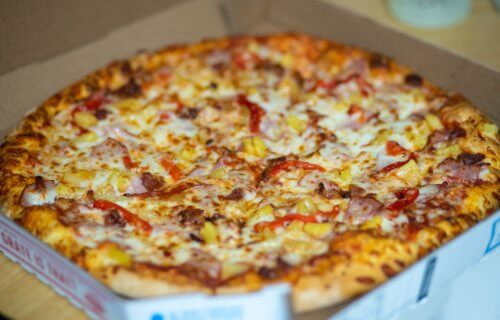BATH, United Kingdom — Love a good slice of pizza? How about 12? Whether you’re going to Thanksgiving dinner or an all-you-can-eat buffet, researchers have good news for foodies. A new study involving pizza finds people can eat much more than what normally makes them feel “full” without causing health problems.
The University of Bath says young men are able to devour twice as much pizza when they push themselves. For some in the study of 22-37 year-olds, this means chowing down two-and-a-half large pies in one meal!
All the food, but none of the guilt
This kind of a meal probably sounds disastrous to health experts. Researchers report the average number of calories consumed during the pizza party was around 3,000, or about one-and-a-half large pies. Despite all the extra calories and fat, the British team finds men don’t suffer any immediate health issues when overindulging occasionally.
“We all know the long-term risks of over-indulgence with food when it comes to obesity, type II diabetes and cardiovascular disease,” lead researcher Aaron Hengist says in a university release. “Our findings show that the body actually copes remarkably well when faced with a massive and sudden calorie excess. Healthy humans can eat twice as much as ‘full’ and deal effectively with this huge initial energy surplus.”
The study in the British Journal of Nutrition reveals the men’s blood sugar levels are no higher after finishing a normal meal. The all-you-can-eat pizza buffet does however create a 50-percent spike in insulin, the hormone that controls blood sugar levels.
CLICK HERE TO SUBSCRIBE TO OUR NEWSLETTER & GET THE LATEST STUDIES FROM STUDYFINDS.ORG BY EMAIL!
Blood lipids (triglycerides and fatty acids) are only slightly higher when eating twice as much food. This surprised the team since previous studies pointed to these fats rising according to how much food a person ate.
“Those tested in this study were able to efficiently use or store the nutrients they ingested during the pizza-eating challenge, such that the levels of sugar and fats in their blood were not much higher than when they ate half as much food,” Professor James Betts explains.
Too tired for dessert?
Researchers say the greatest change after eating such a meal involves the hormones that make you feel full. Hormones known as GLP-1 and peptide YY are released from the gut and stimulate the production of insulin.
Besides your appetite, your mood is also likely to change after stuffing yourself. The study finds participants become sleepy and lethargic within four hours of a “maximal” meal.
The biggest shocker is eating to extremes apparently affects the reward centers of the brain. Participants were so full they turned down sweet treats after the meal. Study authors say eating foods like pizza rarely affects the brain’s desire for pleasurable sweets, which is why humans seemingly always have room for dessert.
Don’t overdo it
While the study says eating twice your normal limit won’t cause a sudden change in your health, this is not something you can do regularly. The more times you overindulge, the more of the excess food begins to build up inside you, leading to obesity.
“The main problem with overeating is that it adds more stored energy to our bodies (in the form of fat), which can culminate in obesity if you overeat day after day,” Betts says. “However, this study shows that if an otherwise healthy person overindulges occasionally, for example eating a large buffet meal or Christmas lunch, then there are no immediate negative consequences in terms of losing metabolic control.”
The University of Bath now plans to look at how maximal eating affects women, overweight, and older eaters.
Like studies? Follow us on Facebook!
